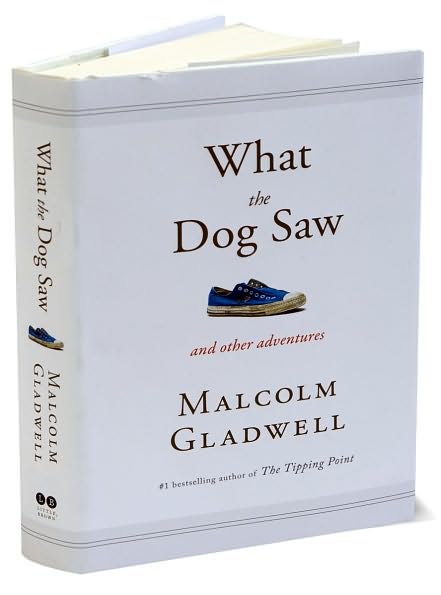We will be discussing Malcolm Gladwell’s What the Dog Saw and Other Adventures at our meeting on Wednesday, October 19, at 4p.m. in the GAHS library. Please post questions, comments, concerns, criticism, and the like on this blog prior to, during, or after our meeting (before October 31st if you want grade-replacement credit). All questions and responses should indicate an active reading of the text and function to move the conversation forward. (Note: surface-level or obvious questions and responses will not count as participation for grade replacement.)
Those of you unable to attend due to scheduling conflicts may particpate in the discussion below by posting a discussion question and offering a detailed response, or by responding to two questions already posted. The note above applies here as well, so heed it!

I liked the way that he put his stories into categories that you may not always think the different topics go together. But in some way, by the end of the collection he had made the stories flow together as one. The first section was stories about the minor geniuses, the second section had stories that showed the flaws in the way that humans think. The third was the most interesting to me because of the topics. This section answered the question is this person capable of being a serial killer, or are they normal?
I liked the authors style of writing. I thought he started off the book well by using a well-written introduction that drew the reader into the book. He carefully selected several very interesting essays that made the reader think from a different point of view. His use of details helped the reader understand exactly what he was talking about and gave them a great perspective into his mind and what he was thinking, which I think was the point of this book.
I’d like to ask you the same question I asked Shirl: If you had to pick one essay that you would rank above all of the others, which one would you pick? What about the essay specifically sheds light into Gladwell’s perspective, and what is his intention in doing so?
tnt.
Was his implications throughout the collection really describing himself or the person he wants to be?
I think that he was trying to portray the person he wants to be. In my experience in life, no one is always the person they want to be. I think that in his stories, he was giving examples of how he wanted to live his life or examples of what happened to him. He uses the stories in the section Obsessives, Pioneers, and other varieties of the Minor Genius to show that use those stories to show that his genius and other’s intelligence is often underestimated in my opinion.
What the Dog Saw was an extremely informative and well written collection of essays. The final part of the book where Gladwell switched from talking about events to talking about individuals is where I feel the book as a whole became ingenious. Some of the time he was hard to understand exactly what he was trying to get across to the reader and made the reader stray away from the text, but his use of details and imagery quickly recaptured the readers’ attention and drew them back in. All of the collections is his own personal way of giving the readers an insight on his own personality and life.
If you had to pick one essay that you would rank above all of the others, which one would you pick? Is there one specific essay that you found difficult? Generally, great writers don’t mislead their readers unless there is a purpose for the detour. Which of Gladwell’s insights did you find particularly endearing?
tnt.
The essay that I would rank above all the others would have to be Most Likely to Succeed, mainly because its basically reflecting on how he went from being just a journalist to a best selling author. The one specifc essay that I found difficult was The Talent Myth. His insights that I found endearing were how he made everything tie in to his own personality and character by including examples of events that have occured in his own life.
why this deceitful and complex method of writing?
Overall i think what the dog saw was a good book. I liked the writer’s writing style, not specifically the syntax, but the way he makes his readers think. He sometimes gives misleading details and definitions to sway the reader, to make the reader think. He avoids the simplicity of ideas, but is more focused on the back stories in order to interest the reader. All in all i think his collection ultimately represents who he is as a person.
Which essay(s) did you find misleading? This is something that we discussed at the meeting, so I’m curious to see if you found the same essays thought provoking.
tnt.